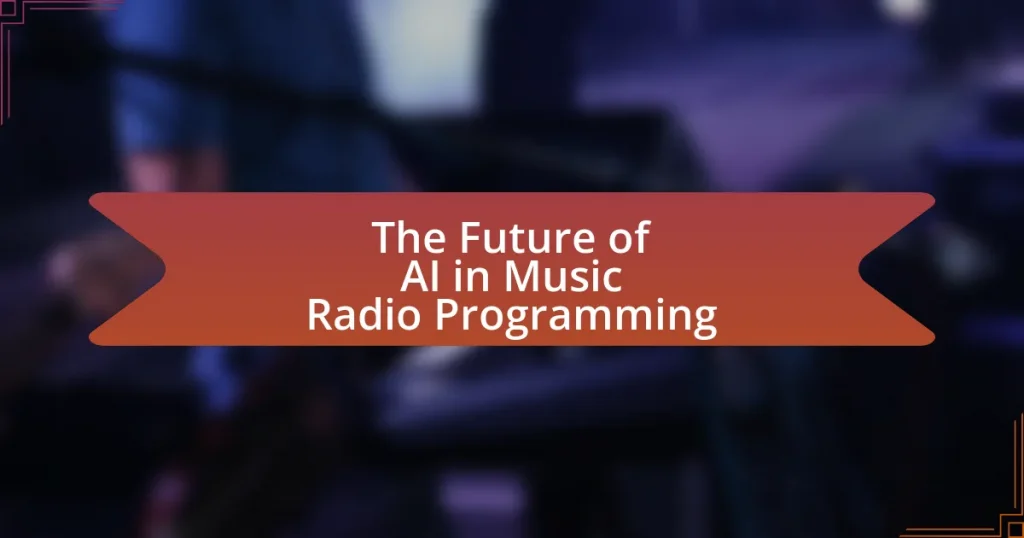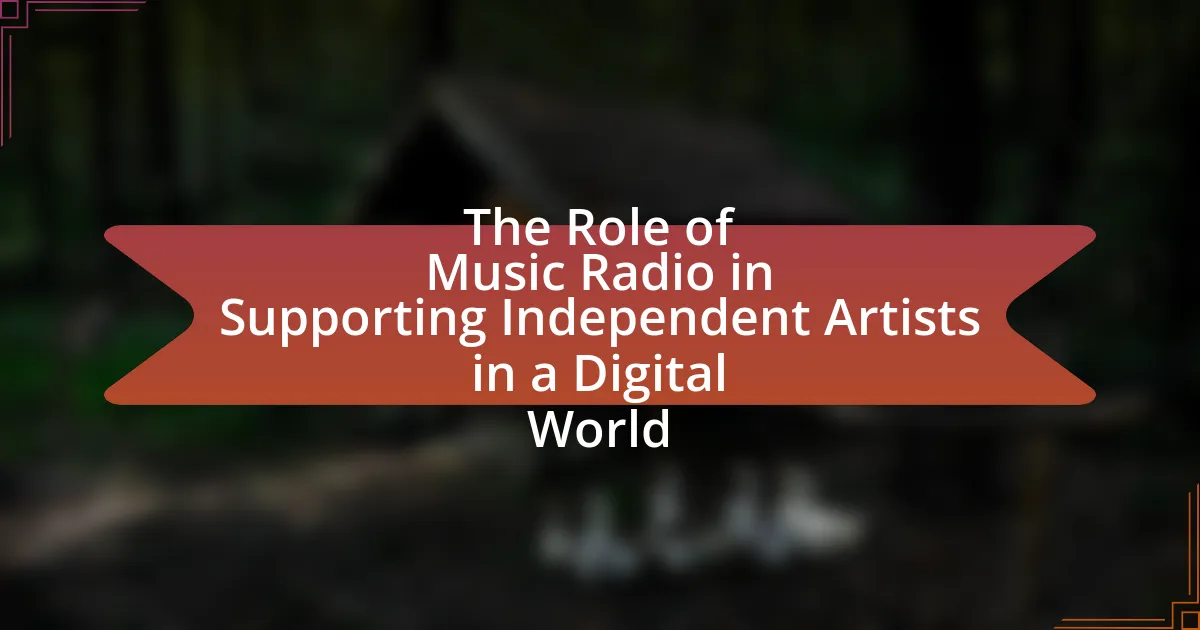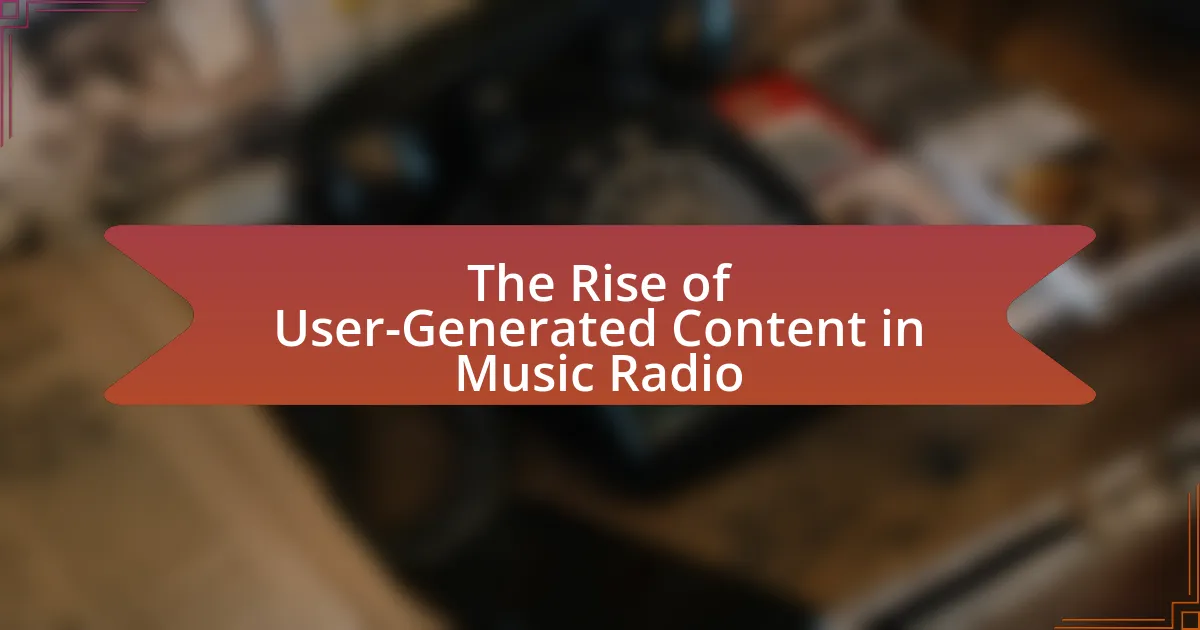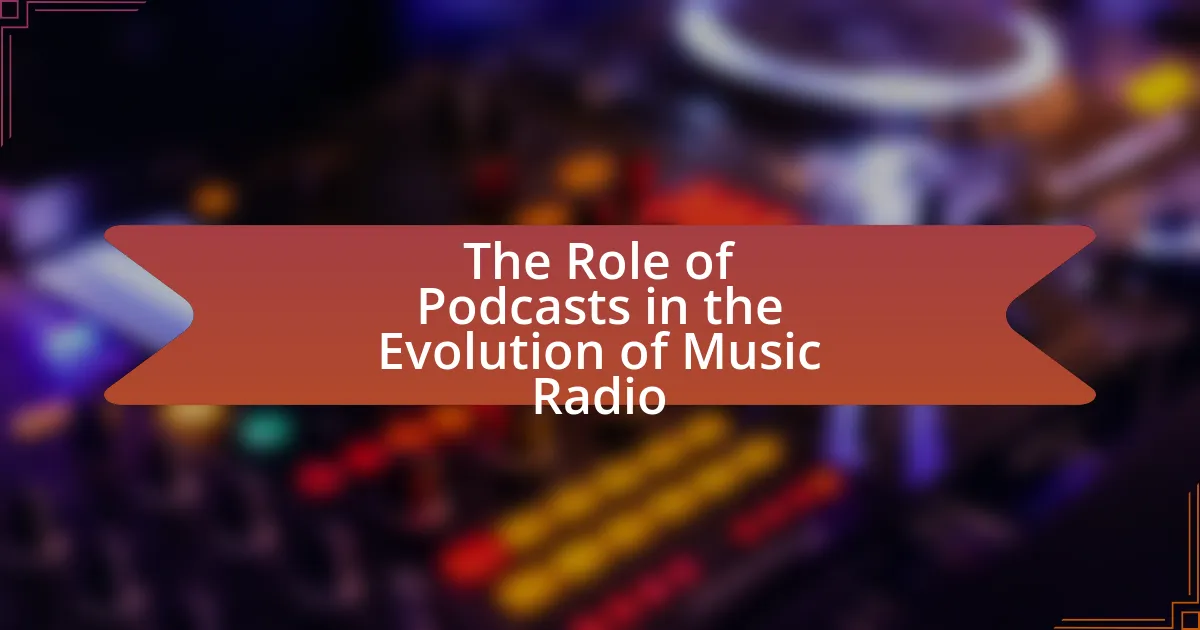The article examines the future of artificial intelligence (AI) in music radio programming, highlighting its role in enhancing personalization and automation. Key topics include current AI applications such as automated playlist generation and audience analysis, technologies driving AI advancements like machine learning and natural language processing, and the implications of AI on listener engagement and content creation. The article also addresses potential challenges, ethical considerations, and future trends in AI-driven music curation, emphasizing the transformative impact of AI on the music radio landscape.
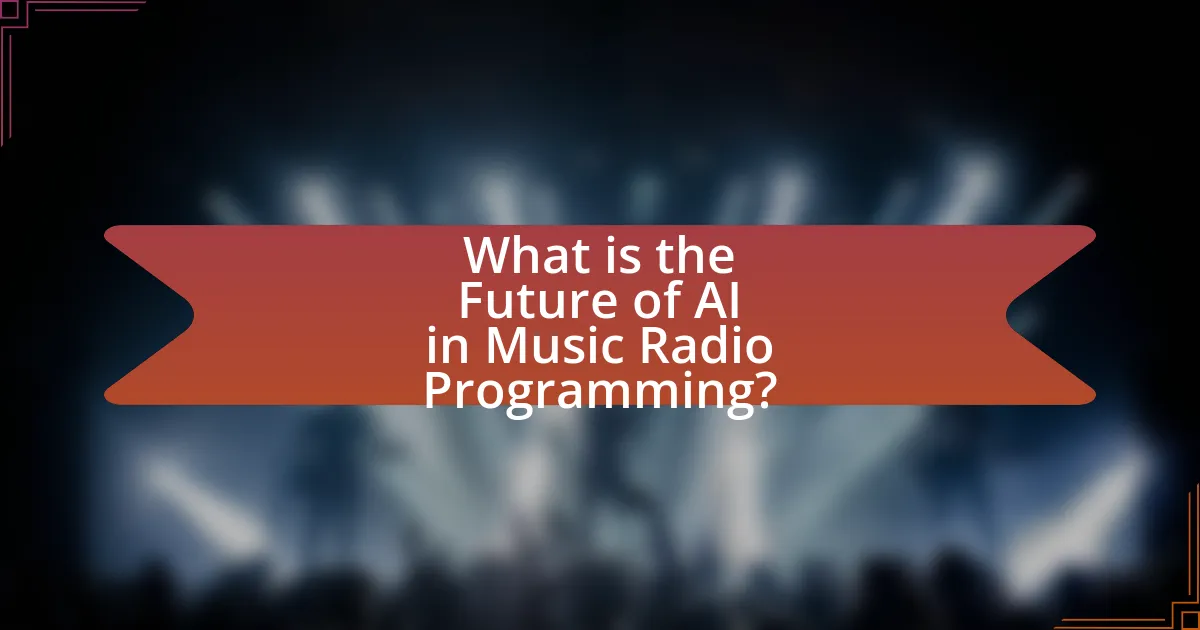
What is the Future of AI in Music Radio Programming?
The future of AI in music radio programming is characterized by enhanced personalization and automation. AI algorithms will analyze listener preferences and behaviors to curate tailored playlists, improving user engagement. For instance, platforms like Spotify already utilize AI-driven recommendation systems, which have shown to increase listener retention by up to 30%. Additionally, AI will streamline content creation, enabling radio stations to generate music mixes and even voiceovers with minimal human intervention, thus reducing operational costs. As AI technology continues to evolve, its integration into music radio programming will likely lead to more dynamic and responsive broadcasting experiences.
How is AI currently being utilized in music radio programming?
AI is currently utilized in music radio programming through automated playlist generation, audience analysis, and personalized content delivery. Automated systems analyze listener preferences and trends to curate playlists that enhance listener engagement, as evidenced by platforms like Pandora and Spotify, which use algorithms to recommend songs based on user behavior. Additionally, AI tools analyze demographic data and listening habits to tailor programming, ensuring that content resonates with specific audience segments. This data-driven approach not only improves listener satisfaction but also increases advertising effectiveness, as stations can target ads more accurately based on listener profiles.
What technologies are driving AI advancements in music radio?
AI advancements in music radio are primarily driven by machine learning algorithms, natural language processing, and data analytics. Machine learning algorithms enable personalized music recommendations by analyzing listener preferences and behaviors, which enhances user engagement. Natural language processing allows for improved interaction through voice recognition and chatbots, facilitating seamless communication between listeners and radio platforms. Data analytics provides insights into audience trends and preferences, enabling radio stations to tailor their programming effectively. These technologies collectively enhance the listening experience and optimize content delivery in music radio.
How do AI algorithms curate music playlists for radio?
AI algorithms curate music playlists for radio by analyzing listener preferences, song characteristics, and contextual factors. These algorithms utilize machine learning techniques to process vast amounts of data, including user interactions, genre classifications, and acoustic features of tracks. For instance, Spotify’s recommendation system employs collaborative filtering and natural language processing to identify patterns in user behavior and suggest songs that align with individual tastes. This data-driven approach enables radio stations to create personalized playlists that enhance listener engagement and satisfaction.
What potential changes can we expect in music radio programming due to AI?
AI is expected to significantly transform music radio programming by enabling personalized content delivery and enhancing listener engagement. With AI algorithms analyzing listener preferences and behaviors, radio stations can curate playlists tailored to individual tastes, leading to increased listener satisfaction and retention. For instance, platforms like Spotify already utilize AI for personalized recommendations, demonstrating the effectiveness of this approach. Additionally, AI can automate scheduling and content creation, allowing stations to operate more efficiently and focus on innovative programming strategies. This shift towards data-driven decision-making in music radio programming is supported by the growing trend of AI adoption across various media sectors, indicating a future where AI plays a central role in shaping the listening experience.
How might AI influence listener engagement and interaction?
AI can significantly enhance listener engagement and interaction by personalizing content and facilitating real-time feedback. By analyzing listener preferences and behaviors, AI algorithms can curate playlists and suggest songs that align with individual tastes, thereby increasing listener satisfaction. For instance, platforms like Spotify utilize machine learning to recommend music based on user activity, which has been shown to improve user retention rates. Additionally, AI-driven chatbots can interact with listeners during broadcasts, answering questions and taking song requests, which fosters a more interactive experience. Research indicates that personalized experiences can lead to a 20% increase in listener engagement, demonstrating the effectiveness of AI in transforming how audiences connect with music radio programming.
What role will AI play in content creation for music radio?
AI will play a transformative role in content creation for music radio by automating music selection, personalizing listener experiences, and generating engaging audio content. AI algorithms can analyze listener preferences and trends, enabling radio stations to curate playlists that resonate with their audience, thereby increasing listener engagement. For instance, platforms like Spotify utilize AI to recommend songs based on user behavior, demonstrating the effectiveness of data-driven content curation. Additionally, AI can assist in creating promotional materials, such as jingles and advertisements, by using natural language processing and machine learning to generate scripts and audio that align with the station’s branding. This integration of AI not only enhances operational efficiency but also allows for a more tailored listening experience, ultimately shaping the future of music radio programming.
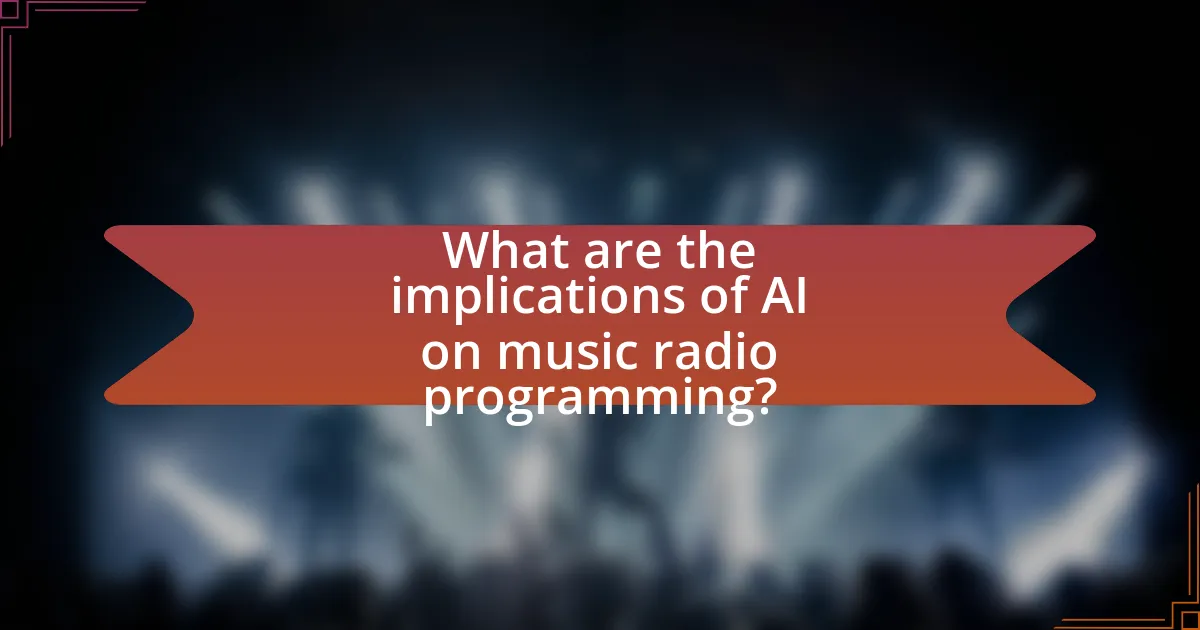
What are the implications of AI on music radio programming?
AI significantly transforms music radio programming by enhancing personalization and optimizing content delivery. Through algorithms that analyze listener preferences and behaviors, AI can curate playlists tailored to individual tastes, leading to increased listener engagement. For instance, platforms like Spotify utilize AI-driven recommendation systems, which have been shown to improve user satisfaction and retention rates. Additionally, AI can automate scheduling and content management, allowing radio stations to operate more efficiently and respond quickly to trends in real-time. This shift not only streamlines operations but also enables stations to focus on creative aspects, ultimately reshaping the landscape of music radio programming.
How does AI impact the diversity of music played on radio?
AI significantly enhances the diversity of music played on radio by utilizing algorithms that analyze listener preferences and trends. These algorithms can curate playlists that include a wider range of genres and artists, moving beyond traditional playlists that often favor popular hits. For instance, a study by the University of Southern California found that AI-driven platforms can introduce listeners to 30% more diverse music selections compared to conventional radio programming. This increased exposure to varied musical styles fosters a richer listening experience and promotes lesser-known artists, thereby broadening the overall musical landscape on radio.
What are the risks of algorithmic bias in music selection?
Algorithmic bias in music selection poses significant risks, including the reinforcement of stereotypes and the exclusion of diverse musical genres. When algorithms are trained on historical data, they may favor popular or mainstream music, leading to a narrow representation of artists and styles. This bias can perpetuate existing inequalities in the music industry, as underrepresented artists may receive less exposure and fewer opportunities. Research by the AI Now Institute highlights that biased algorithms can lead to a homogenization of music, reducing the variety available to listeners and limiting cultural expression. Furthermore, algorithmic bias can alienate certain listener demographics, as their preferences may not be adequately represented, ultimately impacting audience engagement and satisfaction.
How can AI enhance the discovery of new artists and genres?
AI can enhance the discovery of new artists and genres by utilizing advanced algorithms to analyze listener preferences and trends. These algorithms process vast amounts of data from streaming services, social media, and music platforms to identify emerging artists and genres that align with user tastes. For instance, platforms like Spotify and Apple Music employ machine learning techniques to recommend music based on user behavior, leading to the promotion of lesser-known artists who fit similar styles to those already favored by listeners. This data-driven approach not only increases exposure for new talent but also diversifies the music landscape by introducing audiences to genres they may not have encountered otherwise.
What ethical considerations arise from using AI in music radio?
The ethical considerations arising from using AI in music radio include issues of copyright infringement, bias in music selection, and the potential loss of human jobs. Copyright infringement occurs when AI-generated content uses existing music without proper licensing, leading to legal disputes. Bias in music selection can result from algorithms favoring certain genres or artists, which may marginalize diverse voices and limit listener exposure to a variety of music. Additionally, the automation of programming may threaten employment for human DJs and producers, raising concerns about the future of creative jobs in the industry. These considerations highlight the need for ethical guidelines and regulations to ensure responsible AI use in music radio.
How does AI affect copyright and intellectual property in music?
AI significantly impacts copyright and intellectual property in music by creating new challenges in ownership and originality. As AI systems generate music, questions arise regarding who holds the copyright—the creator of the AI, the user who inputs parameters, or the AI itself. For instance, the U.S. Copyright Office has stated that works created solely by AI without human intervention may not qualify for copyright protection, as seen in the case of the AI-generated artwork “Edmond de Belamy.” This indicates a shift in how intellectual property laws may need to adapt to address the complexities introduced by AI-generated content. Additionally, AI’s ability to analyze and replicate existing music raises concerns about potential infringement on existing copyrights, as algorithms can produce works that closely resemble those of human artists.
What measures can be taken to ensure ethical AI use in radio?
To ensure ethical AI use in radio, implementing transparency, accountability, and fairness is essential. Transparency involves clearly communicating how AI algorithms operate and the data they utilize, allowing listeners to understand AI-driven decisions. Accountability requires establishing guidelines and oversight mechanisms to monitor AI applications, ensuring they align with ethical standards. Fairness can be achieved by regularly auditing AI systems to prevent biases in content selection and audience targeting, thereby promoting inclusivity. These measures are supported by industry standards and ethical frameworks, such as the IEEE Global Initiative on Ethics of Autonomous and Intelligent Systems, which emphasizes the importance of ethical considerations in AI deployment across various sectors, including media.
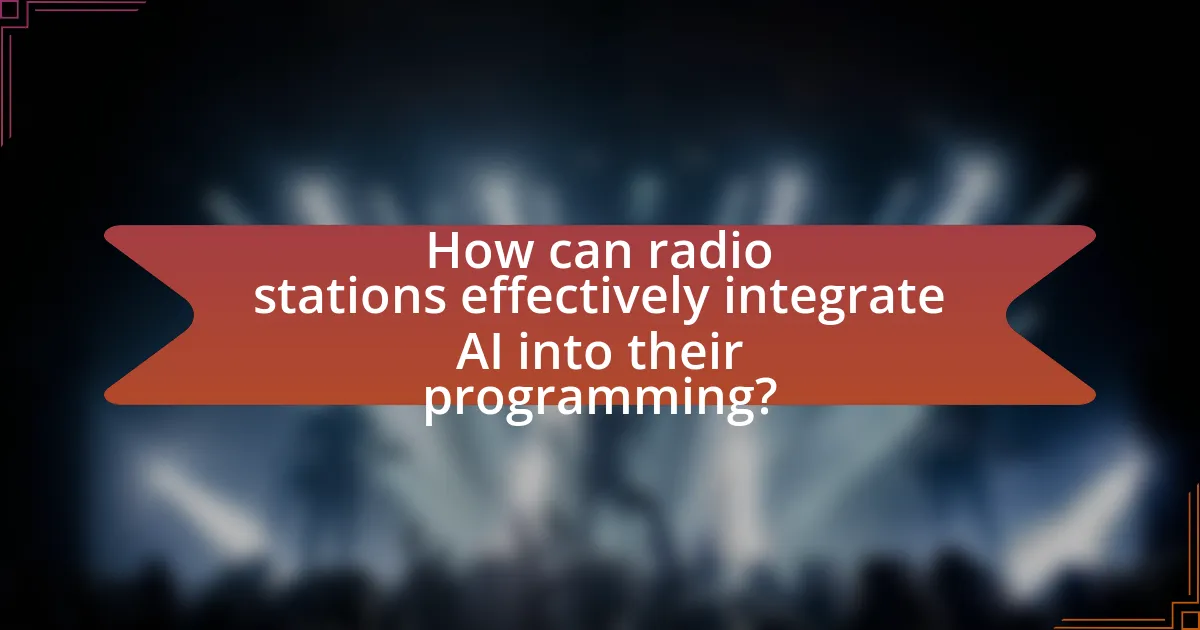
How can radio stations effectively integrate AI into their programming?
Radio stations can effectively integrate AI into their programming by utilizing AI-driven analytics to personalize content and enhance listener engagement. AI algorithms can analyze listener preferences and behaviors, allowing stations to curate playlists and schedule programming that aligns with audience tastes. For instance, a study by the International Journal of Information Management found that personalized recommendations can increase listener retention by up to 30%. Additionally, AI can automate routine tasks such as scheduling and content generation, freeing up staff to focus on creative aspects of programming. This integration not only improves operational efficiency but also enhances the overall listener experience, making radio more relevant in a digital age.
What best practices should radio stations follow when adopting AI?
Radio stations should prioritize transparency, data privacy, and audience engagement when adopting AI. Transparency involves clearly communicating how AI is used in programming and decision-making processes, which builds trust with listeners. Data privacy is crucial; stations must ensure compliance with regulations like GDPR to protect user information. Engaging audiences through personalized content generated by AI can enhance listener experience and loyalty. According to a 2021 report by the International Telecommunication Union, 70% of consumers prefer personalized experiences, highlighting the importance of audience engagement in AI adoption.
How can staff be trained to work alongside AI technologies?
Staff can be trained to work alongside AI technologies by implementing structured training programs that focus on understanding AI capabilities and integration into workflows. These programs should include hands-on workshops, online courses, and collaborative projects that allow staff to interact with AI tools directly. Research indicates that organizations that invest in comprehensive training see a 30% increase in employee productivity when integrating AI into their processes. Additionally, ongoing support and resources, such as access to AI experts and updated training materials, can enhance staff confidence and competence in utilizing AI technologies effectively.
What tools and platforms are available for AI integration in radio?
AI integration in radio can be achieved through various tools and platforms, including IBM Watson, Google Cloud AI, and Adobe Sensei. IBM Watson offers natural language processing and machine learning capabilities that can enhance content creation and audience engagement. Google Cloud AI provides tools for data analysis and personalized recommendations, enabling radio stations to tailor their programming to listener preferences. Adobe Sensei utilizes AI to automate and optimize audio production processes, improving efficiency in content delivery. These platforms are widely recognized for their effectiveness in enhancing radio programming through AI technologies.
What challenges might radio stations face when implementing AI?
Radio stations may face several challenges when implementing AI, including data privacy concerns, integration with existing systems, and the need for staff retraining. Data privacy issues arise as stations must ensure compliance with regulations like GDPR while handling listener data for AI algorithms. Integration challenges occur when existing broadcasting systems are not compatible with new AI technologies, leading to potential operational disruptions. Additionally, staff retraining is necessary to equip employees with the skills to work alongside AI tools, which can be resource-intensive and time-consuming. These challenges highlight the complexities involved in adopting AI within the radio industry.
How can radio stations overcome resistance to AI adoption?
Radio stations can overcome resistance to AI adoption by implementing comprehensive training programs for staff and demonstrating the tangible benefits of AI technology. By providing education on AI capabilities, radio stations can alleviate fears and misconceptions, fostering a culture of innovation. For instance, a study by Deloitte found that organizations that invest in employee training see a 24% increase in productivity, which can directly translate to improved programming and audience engagement in radio. Additionally, showcasing successful case studies where AI has enhanced listener experiences or streamlined operations can build trust and encourage acceptance among staff and stakeholders.
What are the costs associated with implementing AI in music radio?
The costs associated with implementing AI in music radio include initial software acquisition, ongoing maintenance, data storage, and potential workforce retraining. Initial software acquisition can range from thousands to millions of dollars depending on the complexity and capabilities of the AI system. Ongoing maintenance costs typically involve subscription fees for cloud services or updates, which can add up to several thousand dollars annually. Data storage costs are significant as AI systems require large datasets for training and operation, often necessitating investments in robust cloud storage solutions. Additionally, workforce retraining may incur costs related to training existing staff to work with AI technologies, which can also amount to thousands of dollars depending on the scale of the training program.
What are the future trends in AI for music radio programming?
Future trends in AI for music radio programming include personalized content curation, enhanced listener engagement through interactive features, and automated production processes. Personalized content curation utilizes algorithms to analyze listener preferences and deliver tailored playlists, improving user satisfaction and retention. Enhanced listener engagement is achieved through AI-driven chatbots and voice assistants that facilitate real-time interaction, allowing listeners to request songs or provide feedback seamlessly. Automated production processes leverage AI to generate music, create jingles, and even script shows, significantly reducing production time and costs. These trends are supported by advancements in machine learning and natural language processing, which enable more sophisticated data analysis and content generation capabilities.
How will advancements in AI shape the future of listener experiences?
Advancements in AI will significantly enhance listener experiences by personalizing content and improving interaction. AI algorithms can analyze listener preferences and behaviors, enabling platforms to curate tailored playlists and recommend music that aligns with individual tastes. For instance, Spotify’s AI-driven recommendation system utilizes data from millions of users to suggest songs, resulting in a more engaging listening experience. Furthermore, AI can facilitate real-time interaction through voice recognition and natural language processing, allowing listeners to request songs or get information seamlessly. This level of personalization and interactivity is supported by research from the International Journal of Information Management, which highlights that personalized content increases user satisfaction and engagement.
What innovations can we expect in AI-driven music curation?
Innovations in AI-driven music curation will include enhanced personalization algorithms, real-time mood detection, and automated playlist generation. Enhanced personalization algorithms will analyze user preferences and listening habits to create tailored music experiences, improving user engagement. Real-time mood detection will utilize biometric data and environmental cues to adjust playlists dynamically, ensuring that the music aligns with the listener’s current emotional state. Automated playlist generation will leverage machine learning to curate music selections based on trends, user feedback, and contextual factors, streamlining the curation process. These advancements are supported by ongoing research in AI and machine learning, which demonstrates significant improvements in user satisfaction and engagement metrics in music streaming services.
